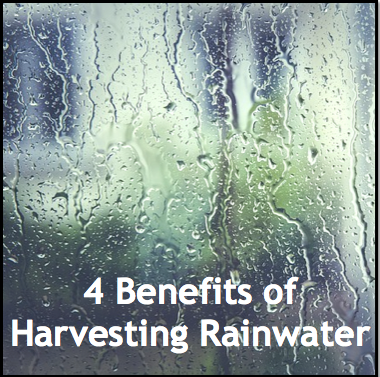When you think about living green and sustainable harvesting, there is often one resource that is overlooked. In fact, unless you live in an arid desert, it’s also something you may take for granted. Water is one of our most plentiful resources, and one that is hotly debated by environmental groups because it is also our most threatened resource. Few people ever think about harvesting rainwater! Guest writer Bobbi Peterson dives in to give us the skinny on why catching rainwater is so valuable!
While that may sound like an oxymoron, the fact is we take it for granted because of how plentiful it is, and as a result, we also are often very careless with how we treat it. Harvesting rainwater is the process of catching rainwater in tanks for use in landscaping and home usage. It is a process that has been around for thousands of years, and as our distant ancestors knew, it’s one that has many benefits.
Keep in mind that in some places, it’s illegal to collect and store rainwater! Please check with your local government before buying and setting up a system. Of course, there are many who believe that catching rainwater is a basic human right and do it anyway. Because of that, there are options out there of ways to catch and store rainwater incognito. There are “rain stones” out there that give a natural-looking, hide-in-plain-sight ways to store your extra water for emergencies, garden, and home use.
Rain is formed by the evaporation of water from lakes, rivers and even the oceans, the resulting water vapor is purified of many contaminants. This is one of the many reasons supporters of rainwater harvesting believe it’s better water for many yard and home uses. Consider the following benefits.
- Easy-to-Maintain Systems
When you compare the cost of large water filtration pumping plants to the cost of a home rainwater collection system, the savings are obvious. In fact, if every home built in a community was provided with a rainwater collection system, there would not be the need for extremely large water purification plants that have high electrical usage.
Lightweight poly storage tanks are perfect for home rainwater collection systems. Compared to many steel tanks, they are more durable, with thicker side walls, and easier to move. They also will not rust as some steel tanks might due to manufacturing welding methods.
- Landscaping Benefits
Erosion is one of the problems homeowners face during strong storms, and by catching the rain that runs off your roof in a tank, you often save yourself hours of landscape repairs to replace sod, plants or soil. Runoff can be directed to a tank by storm gutters, and then the stored water can be reused to water your yard at a future time. Because it’s been filtered by evaporation, captured rainwater is seen by many as better for watering plants and crops because it doesn’t have any man-made pollutants.
Stored rainwater can be used to reduce the demand on your community’s water source when it is reused for flushing toilets, washing cars or washing clothes. Rainwater is naturally pH balanced, and if you have ever accidentally left clothes out on a line during a rainstorm, you may have noticed that when they eventually dry, they are softer without using any chemically laden laundry softeners.
Both independent and EPA studies have shown captured rainwater can be safer to drink than tap water because it is free of ground-water pollutants. However, if you live in an area that has a lot of acid rain from chemical manufacturing plants that may add contaminants to the air, you may want to have your collected rainwater tested before drinking it. In most cases, a simple sediment filter is all you need before using it in the home.
- Living Off the Grid
If you are considering making the move to living off the grid in an effort to reduce your environmental impact, harvesting rainwater is one more way to do that. With solar power, heating with wood fireplaces rather than gas, and eliminating telephone landlines, the collecting of rainwater in tanks or cisterns is the next step to becoming a positive footprint on the planet rather than a negative one.
BONUS: The money saved each year on your bill, whether it’s lower or completely removed from your budget, can add up to hundreds of dollars saved a year! We save over $400 a year by catching rainwater that doesn’t have any of the chemical additives.
Bobbi Peterson loves writing and regularly posts on her blog Living Life Green. She’s also a freelance writer, green living advocate and environmentalist. You can find more from Bobbi on Twitter.







I have a single rain barrel set up at home, and during a rain storm or two, fills up rather quickly. This came in handy this year since August was very dry and I was able to use rain from July to handle the watering.